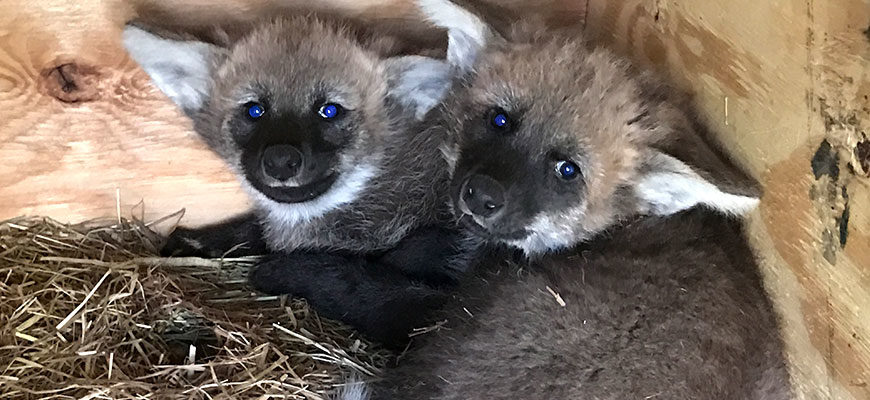| CONTACT: Kyle Shepherd Direct: 502-238-5331 | Media Only: 502-744-5639 kyle.shepherd@louisvilleky.gov |
Update 5/19: Wolf pups are most likely to be seen after 4:40 p.m. due to sleeping patterns. Guests will get a chance to help name the pups in a NAMING CONTEST FROM MAY 22-JUNE 4. Stay tuned for results.
The Louisville Zoo is thrilled to announce the birth of two maned wolf pups. The two females were born February 14 to Sadie and Rocko, both five years old. Each weighed about 7 pounds at the time of their neonatal examinations.
Maned wolf gestation is similar to a domestic dog which is about two months. Sadie has nursed the pups since they were born and they should be weaned at around 4 months of age. Both parents will also regurgitate food to the pups to assist with the transition from milk to solid foods.
Two insulated wooden boxes were added to the center of maned wolf exhibit for Sadie to den with the pups. Guests may have seen Sadie carrying the pups in her mouth to move them around the exhibit and may soon see them following her as they become more mobile.
The Louisville Zoo is continually seeking the very best methods in nutrition, veterinary care, and animal husbandry and consistently monitors the health of the animals. Prior to the fall/winter breeding season, zoo keepers and veterinary staff developed a plan to optimize the health of both adult wolves. Sadie was underweight, had a poor appetite, and suboptimal stool quality. Following a thorough medical evaluation and treatment plan, a diet change was pursued to improve food intake, body condition, and stool quality. This diet change was achieved with collaboration with the Maned Wolf Species Survival Plan (SSP) nutritionist Dr. Cheryl Morris and local Rudy Green’s Doggy CuisineTM creator and President Karla Haas. Special custom-made whole food recipes were developed by these renowned professionals in the field using human grade meats and vegetables.
The Louisville Zoo began experimenting with the custom formulated diet in September 2016 and both wolves were gradually transitioned onto it. The new diet, in conjunction with recommended nutritional supplements by Dr. Morris, resulted in improvements in overall health. The Louisville Zoo is proud that this team approach has resulted in the birth of two maned wolf pups, the first for the Louisville Zoo in 10 years.
The maned wolf is native to South America and can be found throughout Brazil, Paraguay, Argentina, Bolivia, Peru and Uruguay. Maned wolves are solitary. The maned wolf is an omnivore. Half of their diet is fruit supplemented with small mammals, birds and reptiles, insects, nuts, eggs and grass. The IUCN Red List of Threatened Species lists the maned wolf as near threatened.
***
The Louisville Zoo, a non-profit organization and state zoo of Kentucky, is dedicated to bettering the bond between people and our planet by providing excellent care for animals, a great experience for visitors, and leadership in scientific research and conservation education. The Zoo is accredited by the American Alliance of Museums (AAM) and by the Association of Zoos and Aquariums (AZA).
###

